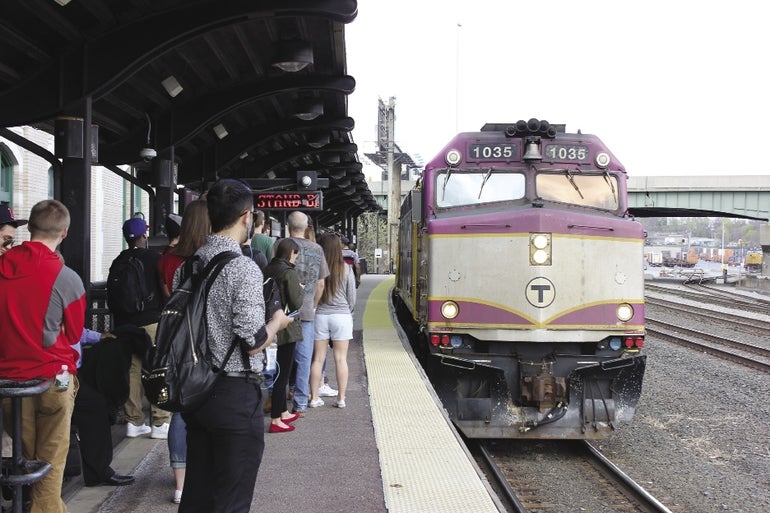Local economists huddled in late January to discuss the state of play in Massachusetts and emerged with the consensus conclusion that the fiscal condition of state government represents a “potentially troubling development for both growth and inequality.”
Specifically, members of the editorial board of MassBenchmarks identified two policy challenges – aging transportation infrastructure and persistent academic achievement gaps in urban areas – as drags on the state’s long-term economic prospects.
“Bottom line, the state economy is doing well despite the global setting of slowing economic growth and rising uncertainty. Still, there are issues that demand attention if the state’s long-run economic health is to be secured. It will take political will and creative approaches to make the necessary investments to meet Massachusetts’ long-term challenges. And the longer the delay, the more expensive the job will become,” MassBenchmarks Executive Editor Robert Nakosteen wrote in a summary released Wednesday that distilled a “spirited” discussion among board members.
Citing “mixed signals” in the state economy, economists said jobs continue to be added at a “brisk pace” and the state continues to outperform the national economy, although growth in gross state product slowed during the second half of 2015.
The economists chalked the national slowdown up to “reductions in nonresidential fixed investment, slowing growth in consumer spending, and the drag on international exports created by the strengthening dollar and slow global growth.”
High tech and knowledge-based companies in Massachusetts are mitigating effects of national and global developments, and the health and education sectors, as well as consumer spending locally, remain “strong,” according to the MassBenchmarks report.
Zeroing in on state government, the economists noted that tax receipts are exceeding projections while non-tax revenues are lower than expected. “In addition, expenses are higher than expected, especially in non-discretionary accounts, perhaps most importantly in areas of health care and health insurance,” the economists observed.
“The most important challenges for the state involve long-term issues, which will require significant investments. A number of these issues represent genuine constraints on the future economic growth and prosperity of the Commonwealth,” according to MassBenchmarks. “Notably, these are areas where return on investment would be high and associated reductions in inequality could be significant.”
The report describes the state’s transportation infrastructure as “in need – in some cases dire need – of repair, refurbishing, and expansion.” And the economists view large achievement gaps in the state’s urban communities as a factor that will “continue to inhibit future economic growth and perpetuate inequality.”
“The upshot is that the failure of many school districts to successfully prepare their students to compete for newly created jobs will have increasingly negative economic consequences for both them and the Commonwealth,” the report said. “High school graduates need literacy and numeracy skills to obtain postsecondary training and education, and postsecondary completion rates need to be increased. The need for ‘middle skills’ in our high-technology companies cannot be satisfied unless students entering training programs start with a strong set of basic skills. Additionally, housing availability and cost have long been issues. Increasing housing supply in areas of greatest need continues to be constrained by a myriad of archaic and highly restrictive state and local regulations.
“Especially in transportation infrastructure and education, there is a clear need for substantial and strategic new investments. In light of these challenges, the choice state leaders have made to freeze state capital investments seems shortsighted and counterproductive. With interest rates near historic lows, failing to make strategic investments in critical infrastructure projects that offer high returns represents a significant, missed opportunity for the Commonwealth.”
The House and Senate this spring and summer will rework Gov. Charlie Baker’s $39.55 billion annual budget proposal, which aims to address structural imbalances and free up investment opportunities in future years by limiting spending growth in fiscal 2017 to 3.5 percent.
The Legislature in April also plans to resume a Constitutional Convention where one of the agenda items is a proposed surtax on incomes above $1 million per year.
The tax, which activists hope to advance to the statewide ballot in 2018, could raise an estimated $1.9 billion. Proponents say language in their constitutional amendment requires the new funds to be spent on education and transportation, but opponents of the measure dispute the ability to order the Legislature to make such appropriations while also arguing the proposed tax could drive individuals and their taxable income out of Massachusetts.
The members of the MassBenchmarks Editorial Board are Frederick Breimyer, Federal Deposit Insurance Corporation; Mary Burke, Federal Reserve Bank of Boston; Karl Case, Wellesley College; Peter Doeringer, Boston University; Robert Forrant, University of Massachusetts Lowell;
Yolanda Kodrzycki, Federal Reserve Bank of Boston; Frank Levy, Massachusetts Institute of Technology; Alicia Sasser Modestino, Northeastern University; Christopher Probyn, State Street Bank; James Stock, Harvard University; David Terkla, University of Massachusetts Boston, and Paul Willen, Federal Reserve Bank of Boston.

